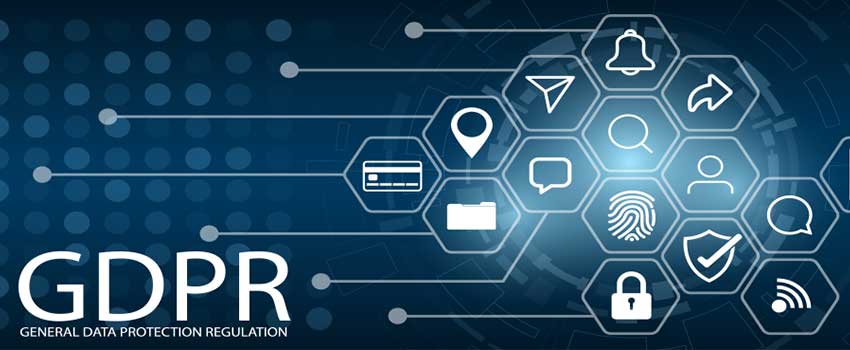GDPR Data Storage: What is GDPR?
Basically, GDPR (General Data Protection Regulation) is a set of laws elucidating the digital rights for citizens of the European Union. It builds on a former policy, known as Data Protection Directive, which Europe implemented back in the year 1995. Most of the ideas outlined in GDPR came from the earlier adopted regulation, and even Fair Information Practices, an older series of principles comprises of the ways customer information should be used.
GDPR in Europe represents one of the strongest and powerful data privacy laws in the world. It gives people the right to ask companies how their personal data is collected and stored, how personal data is used, and even request to delete that personal data. It has also made mandatory for companies to explain how a person’s personal data is collected, stored and used, and moreover get the person’s consent before collecting it. In this case, ‘personal data’ refers to things like person’s name, email ID, and IP address, but also pseudonymized information that can help in tracing back the person.
Under GDPR, many rights are guaranteed. You can forbid the use of personal information for certain purposes, like direct marketing. Say, if you have bought a laptop through an online store, and start seeing ads for similar laptops, you have the right to ask the retailer to stop using your personal data for direct marketing purposes.
Every European citizen has these rights by law, but there are a few companies who grant them to people in another place as well. For instance, Microsoft has given all users control of their data under the new EU privacy regulation. It has a privacy dashboard that allows any user to manage and their personal data.
GDPR Article 5: Principles relating to the processing of personal data states—
“Personal data shall be: (a) processed fairly, lawfully and in a transparent manner in relation to the data subject,…”
GDPR Article 6: Principles relating to public interest as a basis for lawful processing states—
“Processing is important for the performance of a task done in the public interest or.”
GDPR Data Storage for Business
The GDPR claims that data protection regulations aren’t just limited to security. Rather, it is about— the purpose of using the data, the reason for obtaining it in the first place, its accuracy, and the duration to keep it. GDPR compels businesses and organizations to acts, and take the protection of a person’s identifiable information seriously and responsibly. It imposes strict requirements on the way how business is collecting, storing and processing the personal data.
Here’s what you need to know about GDPR Data Storage—
- GDPR Data Storage give EU citizens more control over their personal information and ensures that their data is being strongly protected across Europe, no matter whether the data processing takes place in the EU or elsewhere.
- Personal information can be a name, date of birth, address, contact number, unique identifiers, gender, personal interests, and others.
Many have a misconception that GDPR impacts big organizations only. But, this is not the case. If you actively use a database to store your customer or target information, you cannot ignore GDPR!
According to a source, “92 percent of companies rely on databases to store customer and prospect’s information.”
For that reason, no matter what’s the size and shape of a business, GDPR has an impact.
Why is GDPR crucial to your business?
GDPR covers 3 key areas that every business or organization needs to consider—
- The GDPR regulation itself.
2. The systems you use to store all your customer personal information.
3. The legal sides of the regulation and how it will impinge on the way you handle personal information.
GDPR Data Storage— How to Use the Cloud for Compliance?
This was the basic overview of GDPR. But, how to be safe and what can you do to meet the compliance?
GDPR, General Data Protection Regulation applies to any organization that stores and process the personal information of European residents from any of the EU’s member states. Any company with a website that is gathering personal information through chatbots or forms needs to be in compliance, as your audience and customer could be anywhere. Under GDPR Data Storage regulations, you should accurately control where and how you store data because the people you collect it from can ask you to modify or delete it any time. If you don’t act in accordance with their requests, you will be liable to heavy fines. But money and fines aside, GDPR is good for business.
GDPR presents a real opportunity for businesses and organizations to re-engage with customers and edify them about the benefits of data management and secure data sharing. People will happily grant access to their personal data if their requirements are being met.
With this approach, businesses can get ahead of the game in terms of dispelling any concerns individuals may have about how their personal data is stored and used. Demonstrating that they have strong, safe and sound data governance strategies primed can really go a long way in encouraging customer trust and helping to develop strong brand relationships, something which is fruitful for everyone!
Here at Backup Everything, privacy, protection and data security have always been core to our company principles. Our mission is to improve efficiency and ensure compliance and security. We help your business ensure GDPR compliance in the cloud with data control features, end-to-end encrypted file management, and legal guarantees.
Here are a few ways how cloud storage can help with compliance— making happier customers, generating more profits and indeed, better businesses!
Centralize your Documents— At a basic level, GDPR requires you to know where all of the personal information and data you have collected from people over the time is stored. Businesses must conduct a content inventory where all the personal information may be stored and consolidate all of their documents holding personal data in a secure repository or cloud storage. Backup Everything provides the perfect solution, keeping a proper track of important information and making external and internal audit processes simpler than ever. Moreover, Backup Everything ensures that end-users cannot modify data access permissions to the centralized documents, reducing the risk that files might unintentionally be shared with any unauthorized users or publicly.
Many people are using Backup Everything for data storage as we are fully GDPR compliance. For instance, an organization is creating a library to be used as a registry for all of the information needed to track about students, customers and employees. When they are audited, they will be able to present an inventory of all the crucial personal information they store and promptly identify its location whether to give access to information, modify or delete it.
Automatically Detect and Manage Files Holding Personal Information— As GDPR applies to the content of all type, maintaining a good data management is important. With backup everything, organizations can automatically detect files having sensitive personal data and build a proper workflow to make sure this data is being handled and tracked rightly.
GDPR Data Storage at Backup Everything
The GDPR recommends proper encryption to protect personal information from exposure and unauthorized access. Unlike other cloud storage providers, Backup Everything doesn’t have access to your personal data or encryption keys you manage in your files in the cloud. So, there is no risk of data breaches with us.
At Backup Everything, data security and protection are our key missions. We design and develop products and services with privacy by design in mind, so as to offer the strongest possible protection to all of our users, be it personal users, NGOs, SMBs, enterprises, or journalists. We understand that security and privacy are fundamental human rights. As the GDPR changes these rights into real-data protection obligations for businesses, our aim is to deliver the most secure solution to assist companies to meet these requirements.
No matter if you’re a data processor or data controller, the General Data Protection Regulation, or GDPR will change how you manage personal information in the cloud. Backup Everything helps you meet the new requirements.



